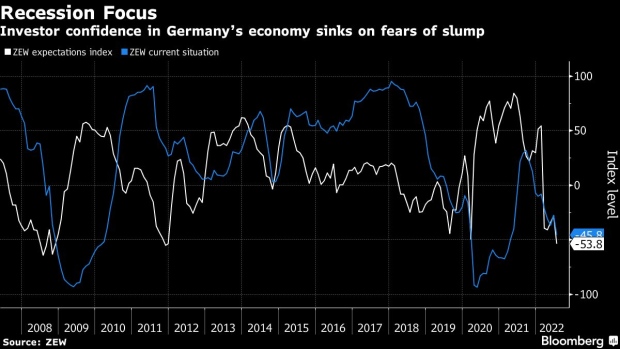Jul 12, 2022
German Investor Confidence Sinks to Worst Since Debt Crisis
, Bloomberg News

(Bloomberg) -- Investor confidence in Germany’s economy slumped to the lowest since 2011 as the country faces the growing prospect of a recession and risks mount that it’s shut off from Russian energy supplies.
Snapping two months of gains, the ZEW institute’s gauge of expectations fell to -53.8 in July from -28 in the previous month, missing economists’ estimates. An index of current conditions also deteriorated.
“The current major concerns about the energy supply in Germany, the ECB’s announced interest rate hike and further pandemic-related restrictions in China have led to a considerable deterioration in the economic outlook,” ZEW President Achim Wambach said Tuesday in a statement.
Europe’s largest economy is among the region’s worst-hit by the war in Ukraine as record inflation cools demand and supply-chain disruptions starve factories of components. There’s a a 55% chance that Germany will slip into a recession in the next year, according to analysts polled by Bloomberg.
Natural-gas flows from Russia, on which the country is highly dependent, have declined in recent weeks before shipments through the Nord Stream 1 pipeline were halted for two weeks of maintenance. If they don’t come back online, Germany may face energy rationing that would harm its key manufacturing industry.
The situation has already led energy giant Uniper SE to ask the government for a bailout. The company may need about 9 billion euros ($9 billion) -- more than twice its market value -- as it tries to replace Russian gas supply with higher-priced alternatives.
The global squeeze on energy supply that’s triggered shortages and sent power and fuel prices surging may yet get worse, the head of the International Energy Agency said Tuesday, telling an event in Sydney that “the world has never witnessed” such a major crisis.
“Expectations for energy-intensive and export-oriented sectors of the economy have fallen particularly sharply, and private consumption is also assessed as significantly weaker,” Wambach said.
(Updates with IEA, more from Wambach in last two paragraphs.)
©2022 Bloomberg L.P.








